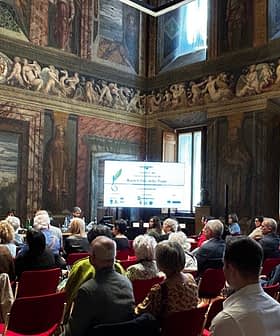Calabria PGI Gets One Big Step Closer
The PGI ‘Olio di Calabria’ has been published in the Official Journal of the European Union. After a five-month period to allow the other member states to submit any objection, the new PGI will be registered.
Another Italian region is set to acquire the Protected Geographical Indication (PGI) after Tuscany and more recently Sicily.
The definitive application for the registration of PGI for extra virgin olive oil from Calabria has been published in the Official Journal of the European Union and now the procedure requires five months to allow the other member states to submit any objection. If there is no opposition, after registration the indication ‘Olio di Calabria IGP’ will be official.
The PGI will reward commitment, sacrifice and professionalism of Calabrian farmers who produce high-quality extra virgin olive oil.
“This is the last step before the final registration of the quality mark certified and recognized by the EU,” announced the president of the Calabria Region Mario Oliverio in a note. “The PGI will reward commitment, sacrifice and professionalism of Calabrian farmers who produce high-quality extra virgin olive oil and will certify that cultivation, milling and production process are entirely realized in Calabria.
“This will protect the Calabrian olive oil sector and will recognized the excellence of its production on Italian, European and international market.” The region, also within the framework of Community support, will continue to pursue the promotion of quality by sustaining producers and encouraging excellence. Moreover, certification will protect consumers since the traceability of the entire production chain will be guaranteed.
The president of Confagricoltura Calabria, Alberto Statti, and the president of the national association of young farmers ANGA Calabria, Giuseppe Barbaro, in a joint statement welcomed the publication in the OJEU as “another important and decisive step. Regional production will be promoted, commercialized and especially safeguarded thanks to a unique quality certification. The name of the PGI ‘Olio di Calabria’ will appear in clear characters on the label, where the year of production shall be specified and the reference to organic production will be allowed.”
According to specification, the PGI ‘Olio di Calabria’ should consist of 90 percent exclusively of extra virgin olive oil produced from local cultivars that are widespread in the region including Carolea, Dolce di Rossano, Sinopolese, Grossa di Gerace, Tondina, Ottobratica, Grossa di Cassano, Tonda di Strongoli, individually or jointly. The remaining 10 percent may come from less widespread local varieties like Nostrana, Spezzanese, Santomauro, Dolce di Cerchiara, Tombarello, Ciciarello, Zinzifarica, Galatrese, Tonda di Filocaso, Tonda di Filadelfia, Borgese, Pennulara, Mafra, Vraja, Agristigna, Corniola, while up to 3 percent may come from other national cultivars that serve as pollinators.
The logo is made up of a reproduction of the Riace bronzes (two naked bearded warriors probably of Greek origin from the fifth century BC, found on the seabed of the Ionian coast near Riace in 1972 and now preserved in the National Archaeological Museum of Reggio Calabria). The emblems of Calabria and its strong connection with the countries around the Mediterranean, are embraced by two stylized branches of olive tree linked by three olives at the onset of ripening, with the intention to suggest the concepts of quality, territory and newness.








